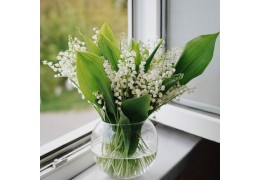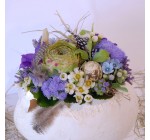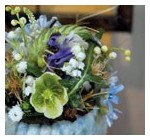Catégories
Search in blog
The benefits of aromatherapy
Flowers are a feast for the eyes. They can also be a source of well-being for both mind and body. Much more than mere ornaments, they have therapeutic virtues that are often little-known. In this article, we explore the essential role of flowers in aromatherapy.
By the way, don't forget to discover our selection of bouquets and take advantage of our flower bouquet delivery service to bring well-being and harmony into your life or that of your loved ones.
Aromatherapy and flowers: a natural alliance
The interaction between flowers and the human senses goes beyond simple visual beauty. Aromatherapy has a profound effect on our emotions and well-being. This age-old practice, which exploits the olfactory properties of flowers, offers a natural and effective way of improving our mental health and emotional balance.

Flowers and aroma therapy
Aromatherapy uses the aromas of different parts of plants (flowers, leaves, bark) to promote health and well-being. In particular, floral aromas can have soothing, energising or balancing effects on our mood and mental health. Smelling floral aromas can reduce your anxiety. It can also promote relaxation and improve sleep quality, soothe headaches and create an atmosphere of calm and serenity.
The science behind floral fragrances
As well as pleasant smells, the fragrances emitted by flowers have a direct effect on our nervous system. Studies have shown that the scent of jasmine, in addition to its soothing properties, may help to increase alertness and efficiency, leading to greater productivity.
By integrating floral aromatherapy into our environment, through essential oils for example, we open the door to an enriching multi-sensory experience, capable of transforming our mood and our perception of the space around us.

Plants and flowers used to make essential oils and their benefits
Lavender: Calm and relaxation
Lavender, the queen of soothing plants, is prized in aromatherapy for its relaxing properties. Its delicate fragrance helps to calm the mind and promote restful sleep. When diffused, lavender essential oil creates a serene atmosphere, ideal for relaxing after a busy day.
Tea tree: Antiseptic and antifungal
Tea tree essential oil, known for its antiseptic and antifungal properties, is a must in aromatherapy. It helps to purify the air and boost the immune system. Used as a vapour, it helps to purify the environment and prevent infections.
Peppermint: Stimulating and relieves headaches
Peppermint is appreciated in aromatherapy for its stimulating effect and its ability to relieve congestion. Its invigorating fragrance helps combat mental fatigue, while relieving headaches. When diffused, it provides an invigorating sensation of freshness.
Roman chamomile: Anti-inflammatory and soothing
Roman chamomile essential oil, with its anti-inflammatory and soothing properties, is a real aromatherapy ally. Its gentle fragrance calms nervous tension, promoting relaxation. When diffused, it creates an atmosphere conducive to relaxation.
Eucalyptus: Respiratory decongestant
Eucalyptus is widely used in aromatherapy for its respiratory decongestant properties. Its invigorating fragrance helps to clear the airways, making breathing easier. As a vapour, eucalyptus is an ideal choice during periods of colds or congestion.
Lemon: Revitalising and purifying
Lemon essential oil is renowned for its revitalising and purifying properties. Its fresh fragrance stimulates energy and helps to eliminate unwanted odours. When diffused, Lemon creates an invigorating atmosphere, perfect for a fresh start to the day.
Bergamot: Emotional balance
Bergamot, with its soft, floral notes, is prized in aromatherapy for its balancing effect on the emotions. Its delicate fragrance promotes relaxation and helps relieve stress. When diffused, Bergamot creates a serene atmosphere, ideal for restoring emotional balance.
Rosemary: Mental stimulation
Rosemary essential oil is known for its ability to stimulate concentration and memory. In aromatherapy, its invigorating scent helps to invigorate the mind, promoting mental clarity. As a vapour, Rosemary is a judicious choice for moments when concentration is essential.
Geranium: Hormonal harmonisation
Geranium essential oil is renowned in aromatherapy for its hormone-balancing properties. Its soft, floral fragrance helps to regulate emotional and hormonal imbalances. When diffused, geranium creates a harmonious atmosphere, ideal for soothing emotional fluctuations.
Rose: anti-inflammatory
Thanks to their astringent properties, rose petals have a soothing effect on mucous membranes and skin, relieving inflammation. Rose water, also renowned for its anti-inflammatory properties, can be used as a gargle to soothe the mouth and throat, as well as being a soothing external ally for the skin on the face. In the case of inflammation of the vaginal mucosa, sitz baths containing rose petal infusion have been proven effective. In the field of energetic aromatherapy, inhalation of Damask rose essential oil is recommended for overcoming emotional wounds and regaining confidence in life. When incorporated into cosmetic preparations, this essential oil boosts self-esteem and encourages the blossoming of individual beauty.
Ce contenu pourrait aussi vous intéresser
-
 The rose: zoom on its symbolism and colors
Read morePosté dans : Cultural point18/01/2021
The rose: zoom on its symbolism and colors
Read morePosté dans : Cultural point18/01/2021 -
 Bouquet of Roses: Origins and Popular Varieties
Read morePosté dans : Cultural point02/08/2023
Bouquet of Roses: Origins and Popular Varieties
Read morePosté dans : Cultural point02/08/2023 -
 The origins of the tradition of offering lily of the valley on May 1st
Read morePosté dans : Cultural point10/07/2023
The origins of the tradition of offering lily of the valley on May 1st
Read morePosté dans : Cultural point10/07/2023


















